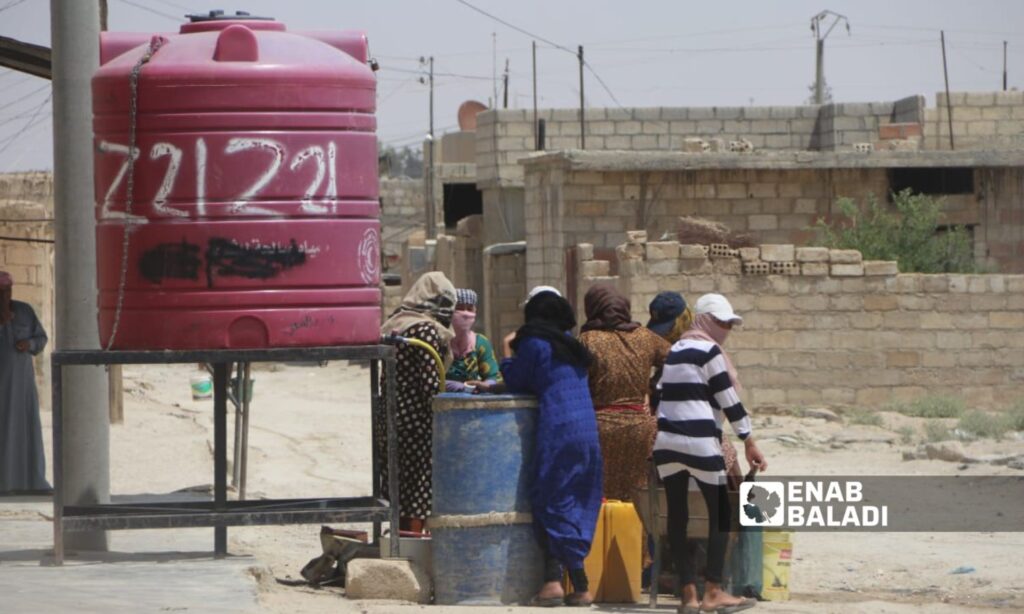Al-Hasakah – Rita Ahmad
Most parts of al-Hasakah governorate have been facing a severe water crisis for years, but its impact on residents’ lives has intensified with the onset of summer and rising temperatures for over a week. This coincides with a series of successive crises in the same sector in the cities and towns of al-Hasakah.
One of the factors that have worsened the water crisis over the past week is the shortage of water tankers and the exploitation of the current situation by their owners by raising prices. The price of five barrels of water has exceeded 50,000 Syrian pounds.
Due to the ongoing crisis, residents are forced to buy water from tankers, which often carry unclean and unreliable water. Additionally, both the distribution network and tank water suffer from high calcium levels, negatively impacting residents’ health.
Power outages exacerbate the problem
The water crisis in al-Hasakah’s cities has been exacerbated by power outages. When water is pumped to residential neighborhoods, electricity is often cut off, depriving residents of the ability to pump water into their home tanks.
At the same time, water is pumped for no more than an hour, leaving residents without power generators unable to retrieve water into their tanks using electric water pumps.
Safaa Kanjo, a 41-year-old resident of Qamishli’s Corniche neighborhood, said she and other residents have been without water for more than eight days. She noted that the rising temperatures have increased their need for water, which they cannot access.
She added that water used to come late at night when the electricity was out, forcing them to use generators to fill their water tank. But now, for the past eight days, water has not reached their neighborhood, forcing them to buy tanker water for daily use and bottled water for drinking, as tanker water is often not potable.
Suhail Abdul Rahman, a 33-year-old employee of the Autonomous Administration controlling the area and a resident of the al-Masaref neighborhood in Qamishli, said the water crisis has been the talk of the street for about a week.
He added that everyone is asking the same question: “Were you able to find a water tanker today?”
The cost of obtaining tanker water has reached 50,000 Syrian pounds, although the local municipality affiliated with the Autonomous Administration has set the price for filling five barrels at 20,000 Syrian pounds.
Abdul Rahman also told Enab Baladi that tanker owners do not cooperate with the residents but instead exacerbate the crisis and exploit the situation.
He added that the price of a water tanker exceeds his financial capacity to the extent that he would need an additional salary to afford water if the situation continues.
Al-Hasakah’s water sources
Al-Hasakah governorate derives its water from three main sources: the Hilaliya station near the village of Navkur west of Qamishli, the Owaija station near the industrial area, and the Jaqjaq station.
The Hilaliya station is the main source for Qamishli, the largest city in the governorate, containing 510 wells and providing drinking water to about 80% of the city’s residents.
Recently, the General Directorate for Drinking Water integrated three new wells into service at the water unit in al-Darbasiyah city after repairs and maintenance were carried out with the support of a Spanish organization.
Additionally, the Allouk station supplies water to al-Hasakah city and its countryside, serving as the main source for about 460,000 people in al-Hasakah, Tel Tamer, and the al-Hol and al-Areesha camps.
Aside from the water shortage, al-Hasakah’s water network suffers from a lack of maintenance and is considered old and dilapidated. Even when water does arrive, it comes contaminated and mixed with impurities and dirt, requiring residents to use filters, which are also costly.
The Autonomous Administration attributes the water, electricity, and fuel shortages in its controlled areas to Turkish air strikes that occasionally target the region.

